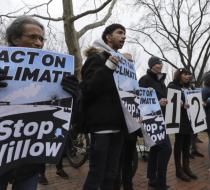Environmental groups file two lawsuits hoping to stop the Willow Project, citing climate impacts Favorite
CNN
—
Environmental and indigenous groups have filed two separate lawsuits challenging the Willow Project on Alaska’s North Slope after the Biden administration approved the oil drilling venture on Monday.
ConocoPhillips’ Willow Project is slated to drill oil in the National Petroleum Reserve, which is owned by the federal government. The area where the project is planned holds up to 600 million barrels of oil, though it would take years for that oil to reach the market since the project has yet to be constructed.
The project has galvanized a recent, sudden uprising of online activism against it, including more than one million letters written to the White House in protest of the project and a Change.org petition with more than 3 million signatures.
Environmental law group Earthjustice and law firm Trustees for Alaska filed the complaints against the Biden administration’s Department of Interior and its top officials, the Bureau of Land Management, the US Fish and Wildlife Service and other federal agencies.
FILE - This 2019 aerial photo provided by ConocoPhillips shows an exploratory drilling camp at the proposed site of the Willow oil project on Alaska's North Slope. The Biden administration is weighing approval of a major oil project on Alaska's petroleum-rich North Slope that supporters say represents an economic lifeline for Indigenous communities in the region but environmentalists say is counter to Biden's climate goals. A decision on ConocoPhillips Alaska's Willow project, in a federal oil reserve roughly the size of Indiana, could come by early March 2023. (ConocoPhillips via AP, File)
The Willow Project has been approved. Here's what to know about the controversial oil-drilling venture
The Willow Project has faced similar lawsuits before; in 2021, a federal judge in Alaska ruled the Trump administration’s environmental analysis for the project was not up to par and vacated its permits. Environmental groups and their attorneys are hoping for a similar outcome this time.
The groups are asking a judge for an injunction, which could halt the project if granted.
In two complaints filed Tuesday and early Wednesday morning, the groups argue that the Biden administration’s environmental analysis still violates federal law, including the National Environmental Policy Act. The groups are arguing the analysis, which concludes that the project won’t have a major impact on the environment or the climate crisis, is seriously flawed.
The complaints tie the project’s potential climate effects to the threatened species, including polar bears, that reside in the region where the Willow Project would be constructed. Earthjustice lawyers write that the Endangered Species Act consultations underlying Willow’s approval “are unlawful, because they fail to consider the impact of carbon emissions on threatened species.”
Federal agencies “failed to consider how the increased greenhouse gas emissions from Willow may affect the survival and recovery of these ice-dependent species or their critical habitat,” the lawyers wrote.
U.S. Interior Secretary Deb Haaland, U.S. President Joe Biden, and U.S. Sen. Lisa Murkowski (R-AK)
Inside the Biden administration's fraught decision to green-light the controversial Willow Project
A spokesperson for the Department of Interior declined to comment on the complaints.
Proponents of the project have argued the Biden administration’s environmental analysis gives them strong legal footing to move forward.
“Even with the modifications, I think it’s fair to say that the work from [Interior], working with the other agencies and Conoco – I’m told that everyone feels that we’ve got a very strong case that will withstand the legal challenge,” Republican Sen. Lisa Murkowski of Alaska told reporters recently. “But we’ve got to get moving to the court.”
The lawsuits are being filed in the US District Court of Alaska, the same court where a federal judge vacated ConocoPhillips’ federal Willow permits in 2021 due to an insufficient federal environmental review done by the Trump administration.
Judge Sharon Gleason said at the time that the review did not include enough analysis on the project’s potential planet-warming emissions and left out details on the project’s possible effect on polar bears.
It was unclear Wednesday if Gleason would be assigned the new case.
Climate activists gather to protest with demanding President Biden stop the Willow Project by unfurling a banner on the Lafayette Square in front of the White House on January 10, 2023 in Washington D.C.
#StopWillow is taking TikTok by storm. Can it actually work?
The suit filed by Trustees of Alaska makes similar arguments, noting the Fish and Wildlife Service determined that Willow wouldn’t jeopardize the “continued existence” of polar bears or destroy their critical habitat. The lawsuit says Fish and Wildlife “failed to articulate a rational connection between the facts found and its no-jeopardy conclusion.”
In a statement, a ConocoPhillips spokesperson said the Biden administration’s final environmental impact statement issued in February “addresses the deficiencies” of the previous environmental analysis.
“We believe the [Bureau of Land Management] and cooperating agencies have conducted a thorough process that satisfies all legal requirements,” the ConocoPhillips spokesperson said.
Environmental groups and ConocoPhillips are each racing against the clock with this legal case and the threat of an injunction.
Because ConocoPhillips must rely on ice roads to build Willow’s major infrastructure, it can only be done during the cold winter months – which could end sometime in April. If groups can win an injunction or vacate the Biden administration’s record of decision, it could delay construction for at least a year.







